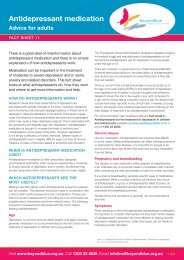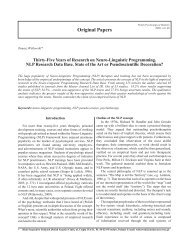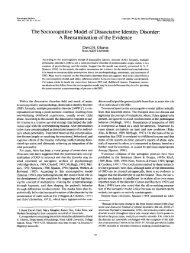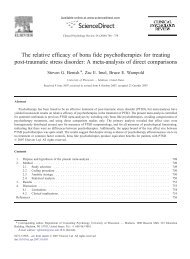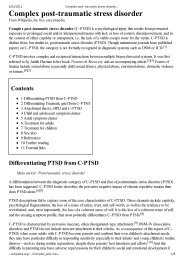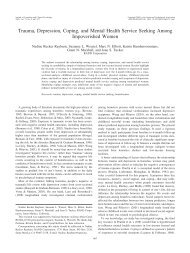Cognitive Mechanisms Underlying Recovered-Memory Experiences of ...
Cognitive Mechanisms Underlying Recovered-Memory Experiences of ...
Cognitive Mechanisms Underlying Recovered-Memory Experiences of ...
Create successful ePaper yourself
Turn your PDF publications into a flip-book with our unique Google optimized e-Paper software.
<strong>Cognitive</strong> <strong>Mechanisms</strong> <strong>of</strong> <strong>Recovered</strong> <strong>Memory</strong><br />
(BWUS PSCI 2247.PDF 12-Nov-08 22:15 105492 Bytes 7 PAGES n operator=T.Prasath)<br />
PSCI 2247<br />
riences said that the women had talked about the abuse before<br />
the recovered-memory experience. Schooler et al. proposed that<br />
these cases illustrate a ‘‘forgot it all along’’ (FIA) phenomenon,<br />
in which remembering an event in a qualitatively new way (e.g.,<br />
more vividly and emotionally) leads the individual to fail to<br />
recall prior occasions <strong>of</strong> recollecting that event. Hence, these<br />
case studies suggest that at least some recovered memories<br />
reflect genuine episodes <strong>of</strong> abuse that people simply forgot<br />
having thought about previously (Geraerts et al., 2006).<br />
DIFFERENT RECOVERED-MEMORY EXPERIENCES<br />
The evidence just summarized suggests two radically different<br />
hypotheses for how recovered-memory experiences come about.<br />
Rather than being contradictory, perhaps the hypotheses reflect<br />
two different types <strong>of</strong> recovered-memory experiences. In one type,<br />
memories arise following a prolonged and intensive effort to uncover<br />
suspected repressed memories. Such recovered memories<br />
are <strong>of</strong>ten induced by suggestive therapeutic techniques. In a<br />
recent study in which independent corroborative evidence for CSA<br />
was sought, none <strong>of</strong> the abuse events remembered through suggestive<br />
therapeutic techniques were corroborated (Geraerts et al.,<br />
2007). Although the lack <strong>of</strong> corroboration does not prove that these<br />
memories were not genuine, it raises the possibility that suggestive<br />
methods induced some <strong>of</strong> these reports and is consistent with a<br />
false-recollection hypothesis.<br />
In the other type <strong>of</strong> recovered-memory experience, people are<br />
suddenly reminded <strong>of</strong> events that they feel they have not thought<br />
about in years. These recovered-memory experiences occur spontaneously—outside<br />
therapy—when individuals encounter reminders<br />
<strong>of</strong> the abuse episodes. Recent work found that memories<br />
recovered in this way are much more likely to be corroborated by<br />
independent evidence (37%) than are memories recovered in<br />
suggestive therapy, and can be corroborated about as <strong>of</strong>ten as<br />
abuse memories that have been continuously available to the<br />
victims (45%; Geraerts et al., 2007). Some such experiences<br />
may be exactly what they seem—essentially accurate recollections<br />
<strong>of</strong> events that the individual has not thought about in<br />
decades. But other cases <strong>of</strong> spontaneous memory recovery may<br />
arise when people fail to remember their prior recollections <strong>of</strong><br />
authentic traumas; such memory recovery would be consistent<br />
with the FIA hypothesis. Remarkably, prior research examining<br />
the cognitive characteristics <strong>of</strong> people reporting recovered<br />
memories <strong>of</strong> CSA has not distinguished these two subgroups <strong>of</strong><br />
people who have recovered memories <strong>of</strong> abuse spontaneously.<br />
Clearly, examining the cognitive characteristics <strong>of</strong> different<br />
populations reporting recovered memories <strong>of</strong> abuse may be informative<br />
for clinicians involved in diagnosing and treating such<br />
patients.<br />
We hypothesized that laboratory measures <strong>of</strong> memory would<br />
show a double dissociation between individuals who recover<br />
memories <strong>of</strong> abuse in suggestive therapy and individuals who<br />
recover memories <strong>of</strong> abuse spontaneously. Specifically, we<br />
predicted that people reporting CSA memories recovered during<br />
suggestive therapy would score high on a measure <strong>of</strong> susceptibility<br />
to false memories, but would perform similarly to control<br />
subjects on a measure tapping the tendency to forget prior<br />
experiences <strong>of</strong> remembering (the FIA effect). Conversely, we<br />
predicted that people who report spontaneously recovered<br />
memories <strong>of</strong> abuse would be especially prone to forgetting their<br />
prior recollections, but would score similarly to control subjects<br />
on false-memory tasks. To test this double-dissociation hypothesis,<br />
we invited subjects to the laboratory to perform tasks tapping<br />
both the propensity to experience false memories and the<br />
tendency to forget prior remembering.<br />
METHOD<br />
Subjects<br />
Subjects were recruited through advertisements in Dutch newspapers.<br />
One hundred twenty Caucasian subjects participated<br />
in this study. All gave informed consent for their participation.<br />
On the basis <strong>of</strong> a 30-min structured interview prior to the<br />
experiment, subjects were classified into four groups, each consisting<br />
<strong>of</strong> 30 subjects. Subjects in the spontaneously-recoveredmemory<br />
group reported that they had previously forgotten<br />
memories <strong>of</strong> CSA and then spontaneously recalled them outside<br />
<strong>of</strong> therapy, without being prompted by anyone else or consciously<br />
seeking such memories. Subjects in the recoveredin-therapy<br />
group stated that they had gradually recovered<br />
memories <strong>of</strong> CSA during therapy, after prompting by suggestive<br />
therapeutic techniques, during an active effort to reconstruct<br />
their missing pasts. It should be emphasized that only people<br />
reporting having undergone suggestive therapeutic techniques<br />
(e.g., hypnosis, guided imagery, dream interpretation) were<br />
included in this group. The continuous-memory group comprised<br />
subjects who reported CSA and said that they had never forgotten<br />
their abuse. The control group consisted <strong>of</strong> subjects who<br />
reported no history <strong>of</strong> abuse in either childhood or adulthood.<br />
These four groups were matched on age (mean age 5 41.75<br />
years, SD 5 10.7), gender (79% female, 21% male), and level <strong>of</strong><br />
education. The frequency <strong>of</strong> different types <strong>of</strong> alleged perpetrators<br />
(parent, family member, friend, stranger) did not vary<br />
significantly across the three groups reporting abuse. Also, the<br />
duration and severity <strong>of</strong> the abuse, as well as history <strong>of</strong> other<br />
trauma, as assessed in the structured interview, did not differ<br />
between these groups. There were no differences among the<br />
abuse groups with regard to anxiety (State-Trait Anxiety Inventory;<br />
Spielberger, Gorsusch, & Lushene, 1970), depression<br />
(Beck Depression Inventory; Beck, Ward, & Mendelson, 1961),<br />
or reported dissociative experiences (Dissociative <strong>Experiences</strong><br />
Scale; Bernstein & Putnam, 1986).<br />
Materials<br />
To examine our hypothesis about the differing origins <strong>of</strong> recovered<br />
memories, we tested our four subject groups on both the<br />
2 Volume ]]]—Number ]]



